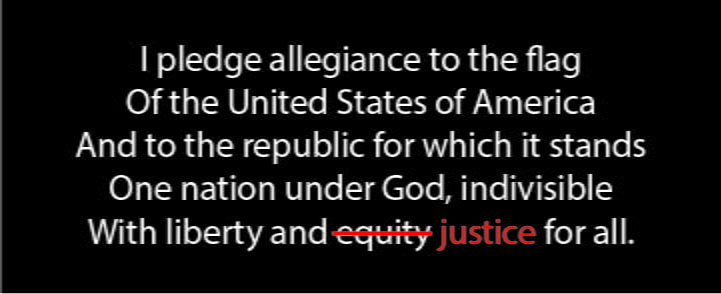
“With liberty and equity for all?” Doesn’t stir the heart in quite the same way as “justice for all,” does it? So why have I been using equity and justice like they’re synonyms when I talk about racial issues? Well, because I hadn’t yet read PRE’s introduction to Grantmaking with a Racial Justice Lens. Yesterday I did, and now I know: what I believe in, what I am fighting for is called “justice.” Not just “equity.”
As PRE points out, “inequitable” is an analysis. It’s a descriptor, and an accurate one, of many of our systems and institutions — but it’s too cerebral to fully express the visceral, life-and-death truth of what we see around us. Even if you translate the opposite of “equitable” as “unfair,” it’s more immediate but it’s still on the level of a playground complaint: “That’s not fair!” There’s a specific thing that needs to get fixed so you and I are treated equally. I didn’t get as big a cookie as she did. You didn’t get paid as much as me for the same job. Unfair is bad; I’m in favor of fairness. But is that all we’re fighting for?
When we say something is an injustice, that’s a call to action, a searing and urgent recognition that something is fundamentally wrong. It operates at the level of both head and heart, mobilizing us to fight against a violation of one of our society’s deepest values. After all, “justice” got enshrined in the Pledge of Allegiance, didn’t it? As schoolkids, we promise every day that we will uphold it. And yes, sometimes calling out injustice is an angry accusation where that’s an entirely appropriate reaction.
In this country, for white people like me, we mostly have the option to stay at the cerebral level. We can spend our time (or not) thinking and considering and evaluating and researching whether and how our society might move in the direction of greater equity. And it’s entirely possible for us white people to do all of that without feeling the breathtakingly cruel injustices of our deeply racialized society and systems ever really, truly hit us in the heart, in all their grotesque and vivid and centuries-long and terrifyingly present reality.
But if we do start to feel it? Then we know: there’s a word for that.
What do we want? Justice. When do we want it? Now.